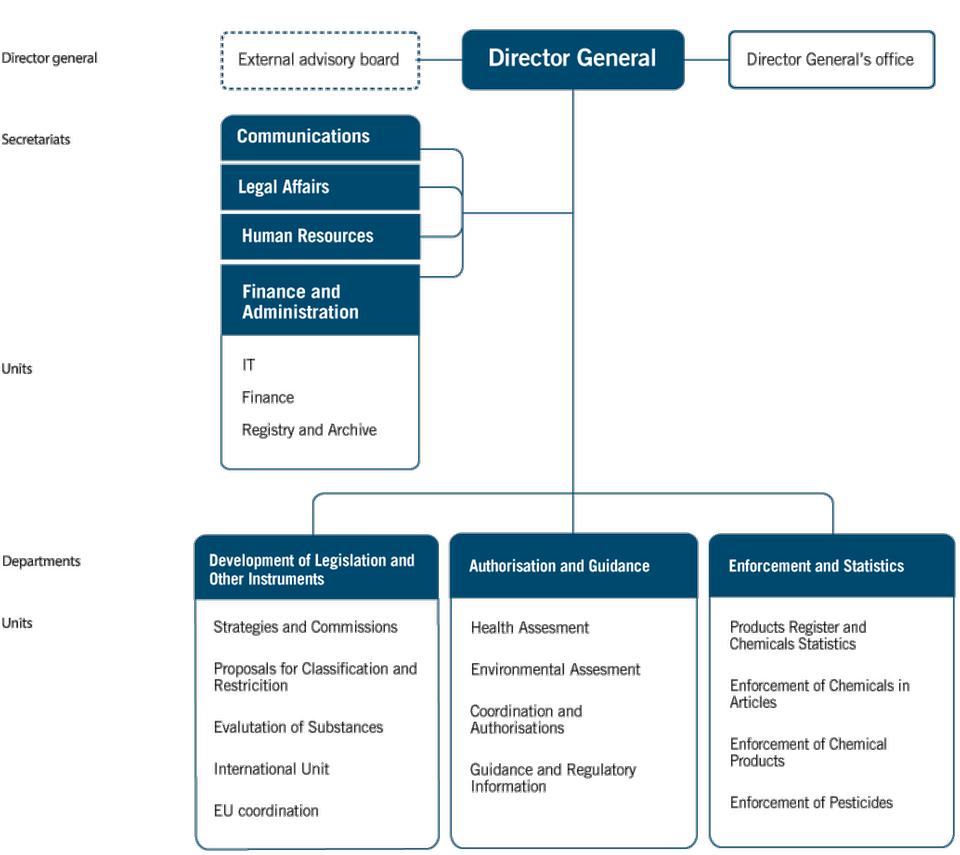Organisation
Content:
The Swedish Chemical Agency comes under the Office of the Director-General, three Departments and four Secretariats.
The Management
The Director-General, three Heads of Department and four Heads of Secretariat make up the Management of the agency.
The Management of the Swedish Chemicals Agency
Departments
Development of Legislation and Other Instruments Department
The Swedish Chemicals Agency takes part in work conducted within the EU, carries out assessments of substances, presents proposals for measures, and prepares documentation for the Swedish Government concerning the development of rules at EU and international level. We decide on and issue our own regulations. We are collaborating at international level to achieve chemicals control.
We are developing strategic areas and instruments by
- supporting the government on strategic environmental issues such as nanomaterials, endocrine-disrupting substances, combination effects and dangerous substances in articles
- maintaining dialogue with different sectors: cosmetics, toys and textiles
- cooperating and supporting other government authorities and organisations
- cooperating within our own area of research
- reporting on government assignments and providing answers to questions on remit.
We conduct assessments of substances by
- carrying out substance evaluations within the framework of REACH and checking the evaluations carried out by other countries
- evaluating active substances and organisms in pesticides (Swedish Rapporteur Programme, SERP) and checking the evaluations carried out by other countries
- participating in working groups.
We produce proposals for measures by
- prioritising substances for the REACH and CLP processes
- carrying out risk management analyses of substances and their properties
- proposing harmonised classification
- providing documentation for the assessment of substances containing particularly hazardous properties
- providing proposals for the restriction of hazardous substances and checking the evaluation documentation provided by other countries
- developing test methods.
We coordinate our EU work by
- establishing strategies regarding the effects of nanomaterials and nano techniques, endocrines and the combination effects of chemicals
- participating in agency and committee meetings on regulations governing REACH and CLP, biocides, and plant protection products
- helping to tighten up the chemical requirements stated in EU product rules on electrical and electronic products, toys, textiles, tattoo paints and washing machine detergents
- contributing to the implementation of international rules at EU level.
We work at international level by
- supporting the Swedish Government in developing and implementing international conventions and agreements which include SAICM, the global chemicals strategy
- participating in Nordic cooperation within the Nordic Chemicals Group
- representing Sweden at OECD meetings with the Chemicals Committee
- being involved in development cooperation at different levels in Asia, Africa and Eastern Europe, such as assisting in the establishment of national legislation, building up institutional capacity and providing training in key competencies
- organising training programmes on chemicals control and cooperating with Sida (the Swedish International Development Cooperation Agency), and UN organisations.
We issue our own regulations
We implement amendments made to EU directives in our own regulations (KIFS).
Authorisation and Guidance Department
The Swedish Chemicals Agency evaluates applications for the authorisation to sell and use pesticides, and we handle applications for derogations. We provide guidance, information and training to companies, authorities, organisations and consumers in order to increase knowledge about the rules applying to chemicals.
Our way of doing this is to
- evaluate applications concerning pesticides
- evaluate applications concerning industrial chemicals
- inform the general public
- support trade and industry
- manage our information service desk Fråga Kemikalieinspektionen
- send out invitations for seminars and training courses
- handle complaints and administer export notifications of hazardous substances.
Enforcement and Registries Department
The Swedish Chemicals Agency carries out inspections of manufacturers and importers of chemical products, articles and pesticides. We provide guidance to municipal authorities and county administrative boards in their enforcement measures relating to chemicals. Chemical products which are manufactured, imported and distributed on the Swedish market are registered in our Products and Pesticides Registers.
Our way of doing this is to
- check that companies comply with the rules and regulations applying to chemical products, pesticides and articles
- check that they correct deficiencies and provide information
- follow up and evaluate the enforcement measures taken
- cooperate on enforcement with other EU countries
- administer the Products and Pesticides Registers
- produce statistics.
Secretariats
- Finance and Adminstration
- Human Resources
- Legal Affairs
- Communications
Council and boards affiliated to the Swedish Chemicals Agency
The Monitoring Board
In addition to the Director-General, who is responsible for the activities of the Agency, the Government has appointed a Monitoring Board, thus satisfying the need for democratic and public control and influence.
The Toxicological Council
The Toxicological Council is an expert body for cooperation between government agencies within the environmental sector. Members are appointed by the Swedish Chemicals Agency.
The Business Executive Council
The Business Executive Council was established in 2015, and its purpose is to give the Swedish Chemicals Agency and those participants invited from the business sector an opportunity to speak on strategic matters relating to issues that lie within the sphere of responsibility of the Agency as well as relating to chemicals in general.

